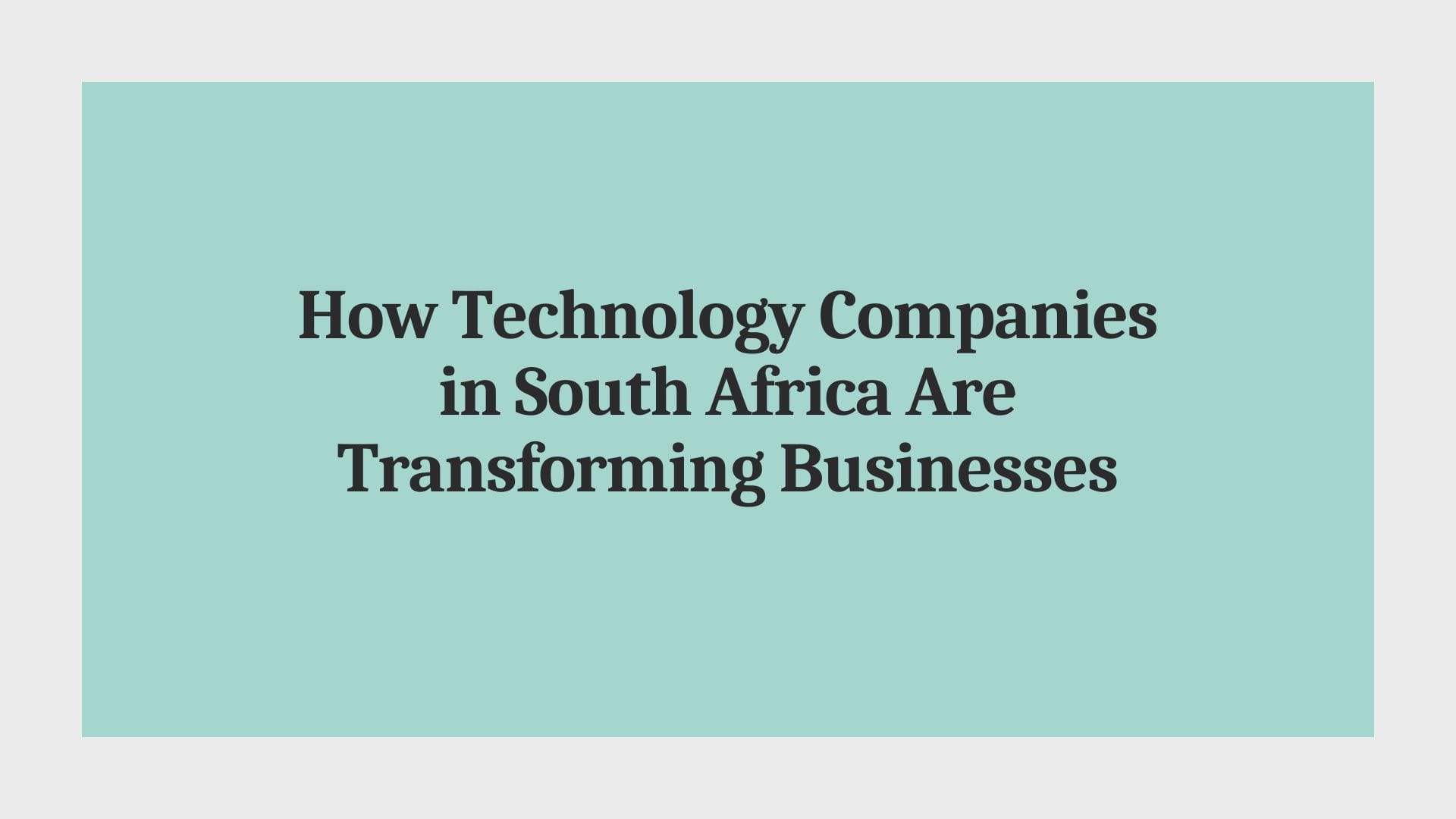How Technology Companies in South Africa Are Transforming Businesses

In recent years, South Africa has emerged as more than just a gateway to the African continent—it’s become a hotbed of digital transformation. Powered by a vibrant tech ecosystem, innovative startups, and agile custom software firms, South African technology companies are redefining how businesses operate, grow, and compete in an increasingly digital world.
From fintech and healthtech to agritech and enterprise automation, here’s how these homegrown tech champions are enabling smarter, faster, and more sustainable business practices.
1. Driving Digital Transformation Across Industries
One of the most profound impacts of technology companies in South Africa is their role in digitizing traditional sectors. Many industries—finance, healthcare, agriculture, and logistics in particular—have long suffered from outdated systems and operational bottlenecks. South African software developers are building tailored solutions that streamline these processes:
- In banking: Fintech startups are delivering mobile-first banking apps, payment platforms, and blockchain-based systems that improve financial inclusion and security.
- In healthcare: Tech firms are creating platforms for remote consultations, digital records, and AI-driven diagnostics—especially vital in rural and under-resourced areas.
- In logistics: Custom dashboards, GPS tracking, and real-time analytics are helping logistics firms optimize routes and reduce delivery times.
These companies are proving that technology isn’t just for the elite—it’s a tool for progress at every level of the economy.
2. Making Enterprise Software Accessible and Scalable
South African businesses, from startups to multinationals, are increasingly relying on local technology partners to develop scalable, enterprise-grade software.
Firms like Ditstek Innovations, SovTech, and Entelect are delivering custom-built CRM systems, ERPs, workflow platforms, and mobile applications. These solutions are not only tailored to business-specific needs but are often cloud-native, modular, and secure—ready for rapid scaling and remote work realities.
This accessibility to custom software allows companies to move away from expensive, rigid off-the-shelf solutions and adopt technology that aligns with their growth strategies and operational models.
3. Supporting SMEs and Startups with Affordable Tech
Small and medium-sized enterprises (SMEs) are the backbone of South Africa’s economy, and local tech companies are ensuring they don’t get left behind in the digital race.
Many software development firms offer affordable MVP (minimum viable product) development, low-code platforms, and cloud-based tools that help startups validate ideas, test markets, and pivot quickly. Companies like Netgen, Byte Orbit, and KRS are particularly known for supporting SMEs with flexible software services.
By reducing the barriers to entry, these tech partners are fostering a new generation of entrepreneurs and job creators.
4. Powering Remote Work and Virtual Collaboration
As global business trends shift toward hybrid and remote work, South African tech companies have responded with innovative tools for communication, project management, and digital operations.
From cloud-based HR systems to secure virtual meeting platforms and real-time reporting dashboards, businesses now operate without borders—thanks to locally developed tech infrastructure. This transition has not only increased productivity but also improved work-life balance and opened up new job opportunities beyond major cities.
5. Creating Jobs and Building Future-Ready Talent
Tech companies are not only creating software—they’re also cultivating the next generation of developers, designers, and data scientists. Many firms are deeply involved in talent development:
- Graduate programs and internships to onboard new talent
- Partnerships with universities and coding bootcamps
- Upskilling initiatives in AI, cloud computing, and cybersecurity
These efforts are helping to close the digital skills gap in South Africa and position the country as a hub for high-quality tech services on the global stage.
6. Expanding South Africa’s Global Tech Reputation
Many South African technology companies now serve clients in Europe, the U.S., the Middle East, and across Africa. Their ability to deliver high-quality software at globally competitive prices has made them attractive outsourcing partners.
Moreover, their familiarity with diverse regulatory environments and multilingual teams allows them to adapt quickly to international projects—be it GDPR compliance, fintech licensing, or language localization.
South African firms are no longer playing catch-up—they’re leading digital initiatives worldwide.
7. Encouraging Inclusive and Purpose-Driven Innovation
A unique aspect of the South African tech scene is its strong focus on solving real social and economic problems. Whether it’s apps that help farmers predict weather patterns, platforms for township-based eCommerce, or digital identity solutions for the unbanked, South African developers are creating inclusive technology that reaches beyond profit.
This purpose-driven approach not only strengthens the local economy but also inspires global admiration for its impact-first mindset.
Final Thoughts
Technology companies in South Africa are playing a pivotal role in transforming how businesses operate—from grassroots startups to enterprise giants. With a blend of technical expertise, cultural diversity, and problem-solving grit, they are driving innovation, enabling growth, and redefining the future of work and commerce.
For companies looking to innovate, scale, or collaborate—whether locally or globally—South African tech firms are not just an option. They’re a strategic advantage.
Frequently Asked Questions (FAQs)
1. What industries are being most impacted by digital transformation in South Africa?
South African businesses across finance, healthcare, agriculture, and logistics are leading in automation and digitization thanks to cloud, AI, IoT, and predictive analytics .
2. How are SMEs benefiting from custom software and low-code platforms?
SMEs leverage tailored MVPs and low-code tools to meet specific business needs—reducing costs while maintaining agility and scalability.
3. What role do cloud computing and SaaS play in business transformation?
Cloud and SaaS technologies enhance operational efficiency and scalability. They support remote work, data security, and real-time collaboration—critical for growth and competitiveness
4. Is AI integration happening in South African firms?
Yes. Companies are incorporating AI and machine learning for data-driven decision making, predictive analytics, and automation—to stay ahead in digital transformation.
5. How are South African tech companies competing globally?
Local firms serve international clients across Europe, North America, and the Middle East. They offer quality software at competitive pricing and demonstrate strong adherence to global standards and regulatory frameworks


